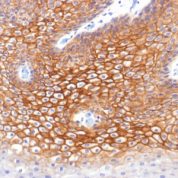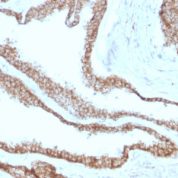Human Anti-Catenin, gamma Antibody Product Attributes
Species: Human
Tested Applications: Immunohistochemistry (IHC).
Clonality: Monoclonal
Anti-Catenin, gamma Antibody Clone: CTNG/1483
Clone CTNG/1483 Host and Isotype: Mouse IgG1 kappa
Anti-Human Catenin, gamma Positive Control Sample: A431, T47D or MCF-7 cells. Skin
Cellular Localization of Antibody Cell Surface and Cytoplasmic
Buffer and Stabilizer: 10mM PBS with 0.05% BSA and 0.05% Azide
Antibody Concentration: 200 ug/ml
Antibody Purification Method:Protein A/G Purified
Immunogen: Recombinant human full-length gamma catenin protein
Storage Conditions: Store at 2 to 8° C (refrigerate). Stable for 24 months when properly stored.
Catenin, gamma Previously Observed Antibody Staining Patterns
Observed Subcellular, Organelle Specific Staining Data:
Anti-JUP antibody staining is expected to be primarily localized to the cell junctions, plasma membrane and vesicles.Observed Antibody Staining Data By Tissue Type:
Variations in Catenin, gamma antibody staining intensity in immunohistochemistry on tissue sections are present across different anatomical locations. An intense signal was observed in bile duct cells in the liver, cells in the tubules in kidney, epidermal cells in the skin, exocrine glandular cells in the pancreas, glandular cells in the appendix, breast, colon, duodenum, endometrium, epididymis, fallopian tube, gallbladder, prostate, rectum, salivary gland, seminal vesicle, small intestine, stomach and thyroid gland, keratinocytes in skin, myocytes in heart muscle, respiratory epithelial cells in the bronchus and nasopharynx, squamous epithelial cells in the cervix, uterine, esophagus, oral mucosa, tonsil and vagina, trophoblastic cells in the placenta and urothelial cells in the urinary bladder. More moderate antibody staining intensity was present in bile duct cells in the liver, cells in the tubules in kidney, epidermal cells in the skin, exocrine glandular cells in the pancreas, glandular cells in the appendix, breast, colon, duodenum, endometrium, epididymis, fallopian tube, gallbladder, prostate, rectum, salivary gland, seminal vesicle, small intestine, stomach and thyroid gland, keratinocytes in skin, myocytes in heart muscle, respiratory epithelial cells in the bronchus and nasopharynx, squamous epithelial cells in the cervix, uterine, esophagus, oral mucosa, tonsil and vagina, trophoblastic cells in the placenta and urothelial cells in the urinary bladder. Low, but measureable presence of Catenin, gamma could be seen in cells in the endometrial stroma in endometrium, fibroblasts in mesenchymal tissue, germinal center cells in the tonsil, hematopoietic cells in the bone marrow, macrophages in lung and pneumocytes in lung. We were unable to detect Catenin, gamma in other tissues. Disease states, inflammation, and other physiological changes can have a substantial impact on antibody staining patterns. These measurements were all taken in tissues deemed normal or from patients without known disease.Observed Antibody Staining Data By Tissue Disease Status:
Tissues from cancer patients, for instance, have their own distinct pattern of Catenin, gamma expression as measured by anti-Catenin, gamma antibody immunohistochemical staining. The average level of expression by tumor is summarized in the table below. The variability row represents patient to patient variability in IHC staining.| Sample Type | breast cancer | carcinoid | cervical cancer | colorectal cancer | endometrial cancer | glioma | head and neck cancer | liver cancer | lung cancer | lymphoma | melanoma | ovarian cancer | pancreatic cancer | prostate cancer | renal cancer | skin cancer | stomach cancer | testicular cancer | thyroid cancer | urothelial cancer |
|---|---|---|---|---|---|---|---|---|---|---|---|---|---|---|---|---|---|---|---|---|
| Signal Intensity | ++ | ++ | +++ | +++ | +++ | - | ++ | ++ | ++ | - | + | +++ | +++ | +++ | ++ | +++ | ++ | ++ | ++ | +++ |
| JUP Variability | + | ++ | ++ | + | ++ | + | ++ | ++ | ++ | + | ++ | ++ | + | ++ | ++ | ++ | ++ | ++ | ++ | ++ |
Limitations and Warranty
enQuire Bio's Catenin, gamma Anti-Human Monoclonal is available for Research Use Only. This antibody is guaranteed to work for a period of two years when properly stored.






There are no reviews yet.